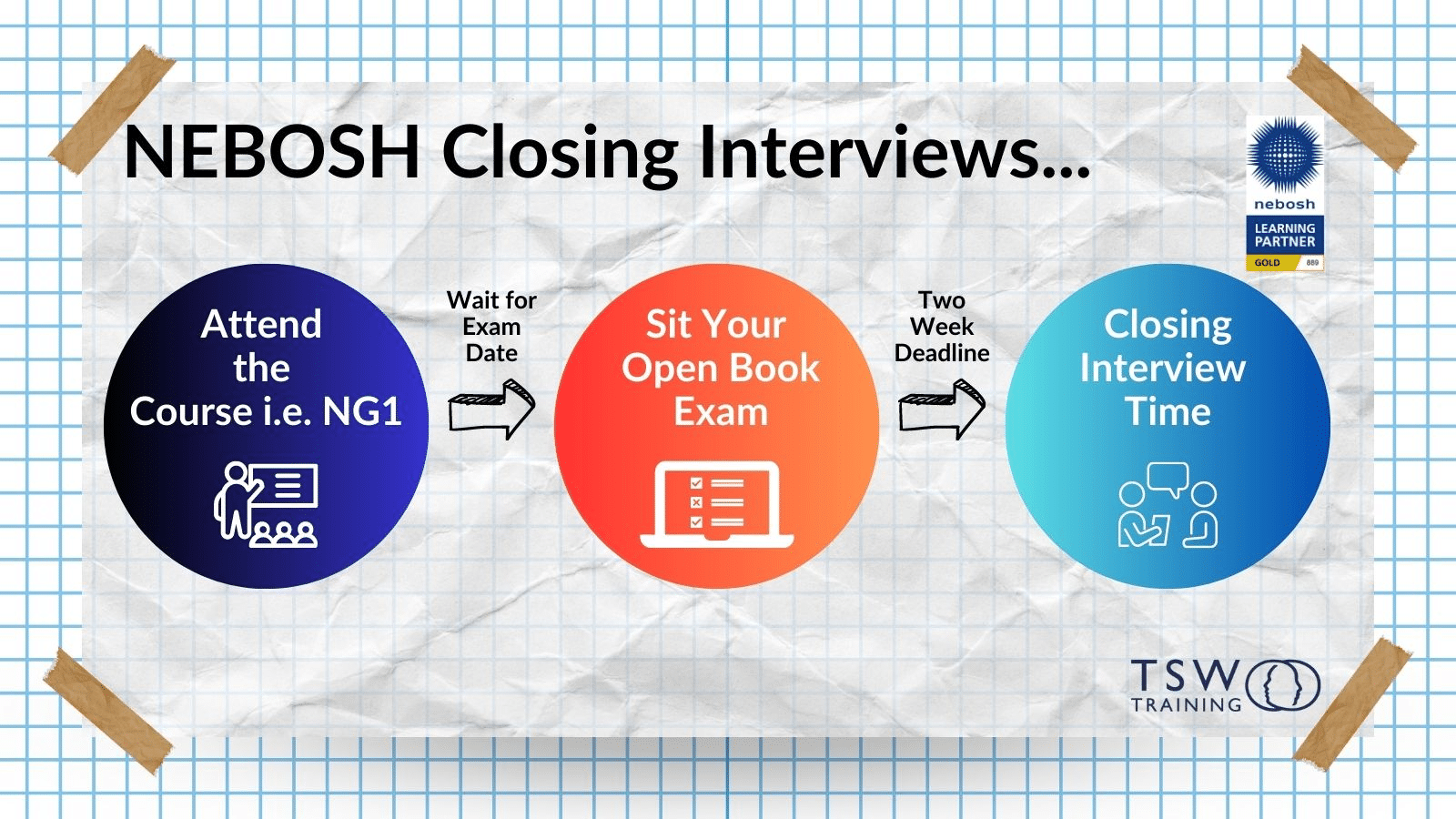If you are planning to take a NEBOSH Open Book Examination as part of your health and safety qualification, you might be wondering what the closing interview is and how to prepare for it.
In this blog post, we explain the mandatory NEBOSH interview following an open book exam, the process learning partners follow, and give you some tips to help you succeed.

What is a NEBOSH closing interview?
This NEBOSH closing interview is a mandatory one-to-one meeting with your learning partner representative to discuss your exam submission. It is a key part of your qualification and occurs shortly after submitting your NEBOSH exam paper.
It’s definitely not something for you to worry about, but NEBOSH’s interview process is a rigorous approach taken on all of their open-book exams. You will notice that its part and parcel with NEBOSH courses & qualifications such as the:
As part of the open book exam process, your interview will take place via a short video call or in person. Options available will depend on the training provider you take your qualification with. At TSW Training, we offer the interview virtually through Microsoft Teams.
⏰ Key Point: NEBOSH requires the interview to occur within two weeks of your exam submission. Failure to attend will result in your mark not being awarded.
What is the purpose of the NEBOSH Closing Interviews?
The purpose of the closing interview is to verify your identity and check that you have completed the exam on your own without any external help. To do so, the interviewer will assess your understanding of the exam questions, scenario and your own answers.
In other words, NEBOSH uses the interview to prevent learner malpractice, plagiarism and collusion.
💡 NEBOSH Closing Interview Misconception 💡
An important thing to understand is that the interview is not an assessment, but it is mandatory.
Thus, it is not graded or marked and will not affect your final exam result.
However, if you fail to attend or complete the closing interview within the timeframe set by NEBOSH, your exam submission and mark will not stand.
What do you need for the closing interview?
You will need a few things lined up to attend your interview. The following list is everything you need to know:
Identification
You will need to attend with a valid form of identification that you are able to show the interviewer. This is to prove that you are who you say you are.
Your options include:
- A passport
- Driver’s license
- National ID card
For interviews by video link
Learning partners will operate different systems to allocate dates and times for your interview.
When you have your interview booked, take some time to make sure you have the following:
- A laptop, tablet or smartphone with a camera and microphone
- A stable internet connection
- A suitable location where you can be alone and undisturbed for about 15 minutes
‘Suitable Location’ Extenuating Circumstances
There are some exceptions to the ‘suitable location’ rule, which must be approved by NEBOSH. The exceptions, as provided by NEBOSH, include:
-
“If you are caring for children or a vulnerable person and you are unable to make safe arrangements for them to be looked after by someone else”
-
“If you require another person to be present during the closing interview as part of a reasonable adjustment. You should discuss this in advance with your Learning Partner”
If either will affect you, speak to your learning partner without delay.
How does the closing interview work?
The interview usually lasts no longer than 15 minutes and will generally follow these 8 steps:
-
Agree on Your Interview Date and Time: You will receive and agree to your interview date and time, which will fall within the two-week period following your exam submission
-
Your Interview Invite: You will receive an email from your learning partner with instructions on how to join the video call.
-
Introductions: Your interviewer will introduce themselves
-
Identification: You will show your identification to the interviewer, and they will confirm that its matches up with your registration details
-
Showing Your Room: You will show the room that you are in so your interviewer can ensure that there is no one else present and that there aren’t any additional resources available.
-
NEBOSH Closing Interview Question Time: Your interviewer will ask you questions from a list set by NEBOSH based on your examination paper. The questions are designed so that you may demonstrate your knowledge and understanding of the exam topics. You are expected to answer them spontaneously without referring to any notes or sources.
-
That’s All Folks: Once you have answered the questions posed, the interview will be closed. We know it’s frustrating, but your interviewer is unable to inform you of the outcome; you’ll have to wait for your final results.
-
Paperwork: The interviewer will complete a Closing Interview Record Sheet and submits it to the learning partner (i.e. TSW Training).
What Happens After Your Interview?
If the interviewer is satisfied that the work is yours, your exam grade will be communicated according to NEBOSH’s timescales.
If your interviewer suspects malpractice of any kind and/or is not satisfied that the work is yours, they will notify NEBOSH, who will contact you to discuss.
In these circumstances, you may be required to attend a second interview with NEBOSH. That or NEBOSH may conduct an investigation to determine if there is malpractice in line with their policy and procedures.
The same stands if NEBOSH suspects malpractice at any point in your qualification. They have a strict policy to deal with these scenarios.
6 Tips for preparing for your NEBOSH closing interview
As the saying goes, practice makes perfect. Now that you know what to expect from the closing interview, you can consider how best to prepare.
Here are 6 tips to help you do just that:
-
Read through your exam paper and answers carefully before the interview. Ensure you understand what each question asked, what scenario was given, what answer you provided and why.
-
Practice answering questions out loud using clear and concise language. Avoid using jargon or slang terms that may confuse or mislead the interviewer.
-
Practice with someone by describing to them what you wrote in your examination. If your interview is to be online, it makes sense to try this via a video link to mirror what you will face in the interview.
-
Choose a quiet and comfortable location where you can focus on the interview without any distractions or interruptions.
-
Before joining the video call, check your device has enough battery power and an internet connection. Check that your video link works and you have the software necessary to log in.
-
Be confident but respectful during the interview. Smile, maintain eye contact and speak clearly. If you don’t know or remember something, admit it honestly rather than guessing or making up an answer. Remember, you are not being assessed!
Closing out on the Closing Interviews
The key thing to remember is that this is not another assessment. So, relax!
The NEBOSH closing interviews are essential in NEBOSH’s anti-malpractice approach, ensuring academic integrity and quality standards for their open book exams. If anything, they serve to increase value for qualification holders.
By following the tips in this article, you will arrive at your interview prepared, knowing what to expect and how to emerge from your meeting smelling of roses.
🏆 Form all of us at TSW, we wish you the very best with those NEBOSH exams! 🏆
Any further questions?
If you’d like to know more about NEBOSH courses they offer and whether they’re the right course for you and your organisation, take a look at our FAQ page, or get in touch with our team of NEBOSH experts.







